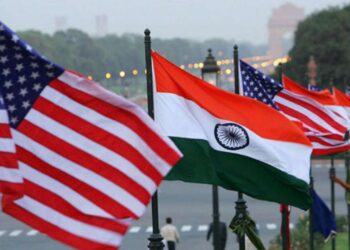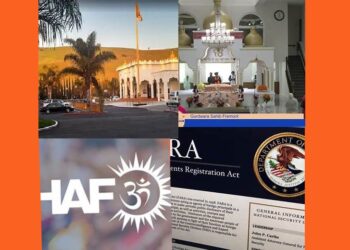Legal Action Against Meta Over Hiring Discrimination
Meta Platforms, the parent company of Facebook, Instagram, and WhatsApp, is facing a lawsuit over allegations that it discriminated against American job applicants by prioritising foreign workers on H-1B visas. The case, brought forward by three U.S. citizens, claims that the tech giant engaged in hiring practices that systematically favoured non-citizens, particularly those requiring visa sponsorship.
The lawsuit has been allowed to proceed by U.S. Magistrate Judge Laurel Beeler in San Francisco, marking a significant development in the ongoing debate surrounding employment practices in the technology industry. The allegations suggest that American applicants were denied equal opportunities, raising questions about workforce policies and the role of skilled foreign workers in the U.S. labour market.
Claims of Hiring Bias in Meta’s Recruitment Practices
The lawsuit was filed by three professionals—Purushothaman Rajaram, an information technology worker, Ekta Bhatia, a software engineer, and Qun Wang, a data scientist. The plaintiffs allege that between 2020 and 2024, they applied for jobs at Meta but were not selected, despite possessing qualifications that matched the job requirements.
According to their claims, Meta’s hiring system demonstrated a pattern of preference towards H-1B visa holders, putting American job seekers at a disadvantage. The lawsuit points to statistical evidence and hiring trends suggesting that a significant proportion of Meta’s workforce consists of foreign workers, particularly those requiring visa sponsorship.
The plaintiffs argue that this hiring approach contradicts U.S. employment laws, which prohibit discrimination based on citizenship status. They assert that companies should prioritise equally qualified U.S. citizens for job vacancies before seeking foreign talent, a principle that federal hiring regulations seek to enforce.
Meta’s Response and Defence Against the Allegations
Meta has strongly denied the allegations, stating that the claims are “baseless” and asserting that the company does not engage in discriminatory hiring practices. A spokesperson for Meta confirmed that the company intends to “vigorously defend” itself in court.
The company argues that there is no concrete evidence proving that it systematically preferred H-1B workers over American applicants. Meta also asserts that the plaintiffs have not demonstrated that they would have been hired had they not been U.S. citizens, further weakening the case against the company.
Meta’s legal team maintains that its recruitment process is based purely on merit and business needs, rather than immigration status. The company emphasises that hiring foreign workers is sometimes necessary due to labour shortages in highly specialised fields, particularly in technology and data science.
Judicial Observations and Statistical Evidence
The court’s decision to allow the lawsuit to proceed was based in part on hiring patterns within Meta’s workforce. Judge Laurel Beeler noted that H-1B visa holders accounted for 15% of Meta’s U.S. workforce, a figure that is substantially higher than the national average, where H-1B workers constitute just 0.5% of the U.S. workforce.
While the judge has not ruled on the validity of the plaintiffs’ claims, this statistical evidence suggests that Meta’s employment practices may warrant further investigation.
This is not the first time Meta has faced scrutiny over its hiring strategies. In 2021, the company agreed to pay up to $14.25 million to settle federal claims that it had excluded American workers from certain job opportunities, opting instead to prioritise foreign applicants. The settlement did not establish wrongdoing but underscored ongoing concerns about hiring policies in the tech industry.
The Role of H-1B Workers in the U.S. Tech Industry
The lawsuit against Meta is part of a broader debate over the role of H-1B visas in the U.S. technology sector. The H-1B visa programme is designed to allow U.S. employers to hire highly skilled foreign professionals in fields where there is a shortage of qualified American workers. The majority of H-1B visa holders work in science, technology, engineering, and mathematics (STEM) industries, where the demand for expertise often exceeds local supply.
Supporters of the programme argue that H-1B workers contribute significantly to innovation and economic growth, filling essential roles that drive the success of major technology companies. Many of the world’s leading tech firms, including Google, Apple, Microsoft, and Amazon, rely on foreign talent to maintain global competitiveness.
However, critics argue that some companies misuse the H-1B system, prioritising foreign workers over equally qualified U.S. citizens to reduce labour costs or exploit visa sponsorship as a tool for workforce control. The lawsuit against Meta fuels these concerns by suggesting that some firms actively bypass American applicants in favour of visa-dependent employees.

Potential Implications for U.S. Employment Policies
The outcome of this case could have significant consequences for hiring policies across the U.S. technology sector. If the lawsuit progresses in favour of the plaintiffs, it could lead to stricter enforcement of employment laws requiring companies to prove that they first prioritise U.S. citizens before considering foreign candidates.
A ruling against Meta could also trigger further legal challenges against other tech firms, prompting regulators to scrutinise hiring practices more closely. Some lawmakers have already proposed reforms to the H-1B visa system, including tighter restrictions on outsourcing and wage requirements to prevent abuse of the programme.
Companies that depend on skilled foreign workers may need to reassess their recruitment strategies, ensuring greater transparency in hiring processes to avoid potential legal risks.
Challenges in Balancing Skilled Labour Demand and Fair Hiring Practices
The case highlights the delicate balance between maintaining a competitive, skilled workforce and ensuring that local job seekers are not unfairly disadvantaged. While global competition demands access to top-tier talent, it is also essential that employment policies remain fair and inclusive.
Some experts argue that greater investment in domestic education and job training programmes could help reduce dependency on foreign workers. Expanding initiatives in STEM education and professional development may provide American workers with more opportunities to qualify for high-demand tech jobs.
On the other hand, restricting access to H-1B workers entirely could harm companies that genuinely struggle to find qualified professionals domestically. Many firms argue that H-1B workers are essential to their success, particularly in fields where technological advancements outpace workforce availability.
The Future of Hiring Policies in the Technology Sector
The lawsuit against Meta could set a precedent for future employment discrimination cases, influencing how tech companies navigate hiring decisions involving foreign workers. If successful, the plaintiffs’ case may prompt other professionals to file similar lawsuits, leading to greater accountability within the industry.
For Meta, the case presents reputational and financial risks, as increased legal scrutiny could impact public perception and investor confidence. The company will need to demonstrate that its hiring practices are merit-based and non-discriminatory to mitigate any potential fallout.
The broader industry will also be watching closely, as the case may shape future immigration policies, employment regulations, and corporate recruitment strategies. Companies may need to rethink their workforce planning, ensuring compliance with both legal standards and ethical hiring principles.
As the case progresses, it is expected to spark discussions among policymakers, business leaders, and advocacy groups about the intersection of immigration, employment fairness, and economic competitiveness. The final verdict could influence how the U.S. approaches skilled migration and labour market dynamics in the years ahead.











